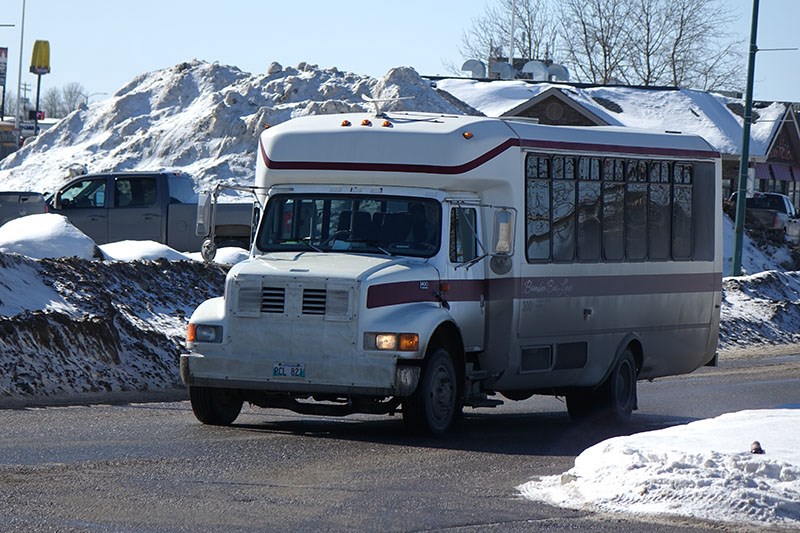Thompson city council approved a resolution to enter into a transit contract with Maple Bus Lines Dec. 19
The four-and-a-half year contract, running from Jan. 2, 2020 to June 30, 2024, will cost $625,144.53 including GST for the 54-month period. Included in the bid are provisions to provide a standby bus at $180 per day per bus, an hourly rate of $130 for mechanical repairs with a three per cent increase every year, and a markup of 30 per cent on materials used for repairs.
The other companies that submitted bids were Mahihkan Bus Ltd. Partnership and NCN Thompson Bus. Mahihkan’s total quoted cost was $1,921,827.73 including GST, with a cost of $900 per bus per day for standby buses, $160 per hour for mechanical repairs with a three per cent increase for 2021 and again for 2023 and 2024. Their proposed markup on repair materials was 10 per cent. NCN Thompson Bus’s quote was for $1,377,915 including GST. Standby buses would have cost $450 per day and the hourly rates for mechanical work were $115 per hour in 2020, $118 for 2021, $120 for 2022 and $122 for 2023 and 2024. Markup on repair materials was pegged at 10 per cent, up to a maximum of $500.
The disparity in the price of the bids sparked some discussion amongst the five councillors who voted in favour of the contract (Mayor Colleen Smook excused herself from the vote due to a conflict of interest).
“How come such a big difference in the price?” asked Coun. Earl Colbourne. “Can they do it on that amount? And what happens if they can’t do it?”
City manager Anthony McInnis said the city wasn’t privy to internal details about the companies that submitted bids.
“Whatever the price that’s submitted is the price that’s received,” said McInnis. If the company proves unable to provide the service for the price it bid “then the service would be terminated by the city.”
“They have to live by it and hopefully they can operate for that amount of money,” said Coun. Brian Lundmark.
Coun. Jeff Fountain asked if having the same company that provides standby buses do the maintenance was wise.
“There could be questions with regards to the legitimacy of maintenance concerns given that there’s the ability for the company to be making money for standby buses," he said.
McInnis said he believed the contract included a provision for city mechanics to be able to verify if maintenance work is required.
The request for proposals issued in mid-November sought an operator to run two buses on weekdays from September to June. One would run on a longer route from 7:30 a.m. to 5:30 p.m. and a second on a shorter express route for students from 7:30 a.m. to 4:30 p.m. In the summer, one city-owned bus will offer weekday service. The city also said in a press release that fare increases would be phased in over five years.
It has been nearly six months since there was last city transit service in Thompson.
“I’m glad it’s finally coming to an end so that the citizens of Thompson will have a transit service back in place for the new year,” said Coun. Kathy Valentino.
The current city transit suspension follows four-and-a-half months of public transit service provided by Maple Bus Lines from the middle of February to the end of June 2019, which was preceded by a three-and-a-half month suspension of service that started Nov. 1, 2018.
Maple Bus Lines received $181,896.22 in payments from the city for that service from February to June.
In 2017, the city paid Greyhound $424,192.12 for its services and collected $95,842.20 in bus fares from roughly 53,000 riders, mostly during the school year. Greyhound stopped operating Thompson transit when it shut down its Western Canada operations Oct. 31, 2018. During a five-year agreement between the city and Greyhound from 2011 through 2015, the average annual cost of operating transit was about $273,000.




